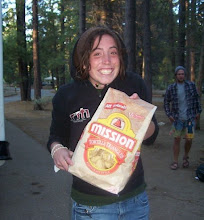Your lungs don't work? we'll put you on a ventilator.
Your SA node gets off beat? we'll give you a pacemaker.
Your sphincter can't hold it in? we'll give you a Foley catheter.
Your kidneys refrain and retain? we'll put you on dialysis.
You can't digest this? We'll give you total parenteral nutrition.
This is not poetry, there is nothing poetic about this.
There's no beauty in the words sphincter, dialysis, total parenteral nutrition.
I'm not going to dignify them by trying to think of their rhymes.
Human, where are you?
What are you doing for yourself?
If I want care for you I will care for the machines.
Maybe you'll heal.
Maybe you are only a temporary ROBOT!
Or maybe not.
Maybe your lungs and kidneys have gone to heaven.
Maybe they are waiting for you next to your memories, reason, and sense of humor.
What are you doing here?
Who's keeping you?
This all sounds terrible.
What should I apologize for?
Monday, September 21, 2009
Sunday, September 13, 2009
"The Spirit of the Marathon"
Yesterday I watched this documentary called "the Spirit of the Marathon". It follows the stories of 6 runners preparing for the Chicago Marathon. Two of the runners are elite athletes in who hope to finish first in their gender groups. The others are runners of various ages and experience levels. It really protrays the uniqueness of not only the sporting event, but also of those participating in it.
The marathon is such an interesting event because few people can just wake up one morning and decide to deck out 26.2 miles, however, I also believe that few people, with adequate training, are incapable of completing a marathon. So in that way it takes oridinary people and transforms them into someone extraordinary, someone who can complete a 26.2 mile run/walk/jog whatever you need to do to finish it.
And that's what I like about a marathon; everyone has a story for how they got to the starting line. Training your body to be able to take 26 miles is not something you have to do to be human, so why do it? What does it mean for people to complete this? What are they competing against? What motivated them 4+ days a week for the last few months to get up and run for hours on end?
I've volunteered at the finishline of a marathon before, and its quite an amazing experience. People's emotions and expressions at that place show me that they have done something much greater than running 26.2 miles. And that's what I really like about it; you take your challenges, doubts, demons, divorces, weaknesses, whatever it is that drives you to run, and you move through them. You don't just sit and journal, but you take your mind's thoughts, your soul's dreams, your exocrine gland's sweat, your muscle's glycogen and ATP, your lung's oxgen and whatever else you carry with you and you physically move yourself for 2-6 hours (depending on who you are). Finishing a marathon is a holistic victory.
The marathon is such an interesting event because few people can just wake up one morning and decide to deck out 26.2 miles, however, I also believe that few people, with adequate training, are incapable of completing a marathon. So in that way it takes oridinary people and transforms them into someone extraordinary, someone who can complete a 26.2 mile run/walk/jog whatever you need to do to finish it.
And that's what I like about a marathon; everyone has a story for how they got to the starting line. Training your body to be able to take 26 miles is not something you have to do to be human, so why do it? What does it mean for people to complete this? What are they competing against? What motivated them 4+ days a week for the last few months to get up and run for hours on end?
I've volunteered at the finishline of a marathon before, and its quite an amazing experience. People's emotions and expressions at that place show me that they have done something much greater than running 26.2 miles. And that's what I really like about it; you take your challenges, doubts, demons, divorces, weaknesses, whatever it is that drives you to run, and you move through them. You don't just sit and journal, but you take your mind's thoughts, your soul's dreams, your exocrine gland's sweat, your muscle's glycogen and ATP, your lung's oxgen and whatever else you carry with you and you physically move yourself for 2-6 hours (depending on who you are). Finishing a marathon is a holistic victory.
Subscribe to:
Comments (Atom)
